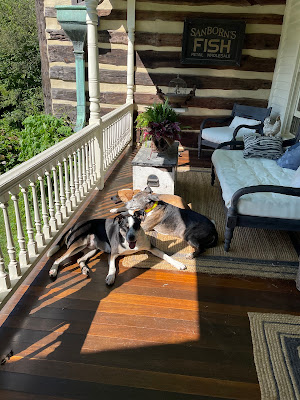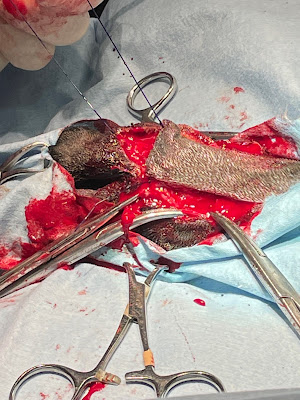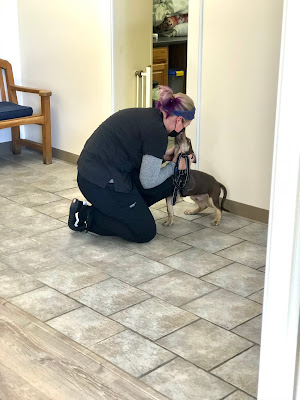On a Facebook page for vets to assist other vets I saw this comment. It stopped me in my tracks. It also made me question where this profession is at, and, whether we want to change our collective persona. It was also another reminder that the veterinary world that I live and work in is a far cry from what others do.
 |
| Storm in his holiday cheer |
There are numerous Facebook groups dedicated to vets helping other vets with difficult cases, and, of course the clients that come along with them. It is our international social media network for vetmed advice. This particular post, like many of them, was about a perplexing case with a client who had limited resources, or as we like to coin it, "financial constraints" aka no money. Most of these cases have the typical presenting facts; dog, age, breed, spayed/neutered, pertinent history, along with presenting owner concerns, and, veterinarians physical exam findings. This particular case involved a cat who was having trouble breathing. Scant details about patients history, (and/or details the vet thought the client was withholding to look better; think marijuana, drugs, illegal ingestion or access to stuff), and therefore vet really only had that and their physical exam findings to go on. This is an all too common scenario. People show up with a very sick animal and little-to-no details about how, when, why, or even last time the pet saw a vet. Think; umm? don't know how long the pet has been like this? Don't know when, or if ever, it saw a vet? Don't know if they could have gotten into something (like weed or toxins)? Don't know when they last ate, or, went to the bathroom? Or any tiny tidbit of relevant helpful information to assist in this case. Turns out the vet thought the chest sounded too quiet, (indicating there might be fluid in the chest making breathing harder, and hence, breath sounds absent). When a client without any money for things like x-rays, or a chest tap (to try to remove the suffocating chest fluid) the patient has little help of getting help because the clients didn't have enough money to allow for the most basic of diagnostics. It happens with almost every case. We make do with little diagnostic dough on a daily basis. It is almost impossible for me to try to explain how hard practicing medicine is when you don't have the liberty to run tests.. like any tests. Even the most basic/cheap diagnostic tests. Try to analyze a sick, almost lifeless non-verbal being with just your eyes, ears, hands, and nose. We do it all day every day. We also get convinced to guess so much that it too often makes us believe that we are truly very good guessers. I dare say we are too often cocky with our presumptive diagnoses as there is no one to prove us wrong. The clairvoyant diagnostician with no data to ever prove us a charlatan.
What was most shocking to me about this particular post wasn't that people weren't giving the advice I give my vets (which is listed below), but, worst of all that one vets advice was to;
"not spend all of the clients money so that they could no longer afford euthanasia."
I suppose I am deeply and ethically perplexed that this is valid advice. I also wonder how many of us veterinarians live here in this place where mercy only comes with a price tag? And, why would we want to? Aren't we being both neglectful and hypocritical if so? Aren't we both absent in our compassion towards our patients (and no, I did not say client,, because we all know that we love to punish them), but also hypocritical in our own advice of "it's neglect if people get a pet that they cannot afford?" Can we really be so cold and cruel to allow suffering if it doesn't make us money? Don't we dish that judgmental sputum daily? Blame the pet parents when their pet gets sick because they couldn't prevent the preventable? And then deny them a compassionate end when they run out if resources to permit it? Aren't we complicit in promoting negligence that perpetuates suffering because we do not offer affordable euthanasia's? I know of some places that charge $400-600 for euthanasia. (It is $125 here at my clinic). If you cannot afford it, AND, (big and here!) if we truly believe that it is in the pets best interest to be euthanized, should we then be doing it for free? Are we really reminding each other that we should spare the $600 to help save the pet so that we can euthanize them profitably?
Holy Crap where has this profession gone?
I don't (and won't ever) add the cost of a euthanasia into the cost of a patients care. I also don't list it as a treatment option. It's an option, as it should be for every living being that suffers in dying, but lets not elevate it to a "treatment". It is not the last line item in the long list of charges for both goods and services that I feel the patient will need to get better. After all isn't that our primary goal? Getting patients better? Aren't we all collectively responsible for helping pets get and feel better? No veterinarian should withhold euthanasia due to cost. And yet it seems we do? I have never even considered adding/budgeting/listing this on an invoice when a patient is at the clinic asking for care. As if the tally of the 'total cost of care' needs to include this? Is euthanasia part of our "care" package? I am not arguing that it isn't, but, I am asking why we make room for this at the expense of doing what we all came here to do? Am I asking for too much room? Too much compassion? (Yes, probably). I am asking for a sliding scale of care. You know the kind that gives you a "freebie" euthanasia when financially warranted after a client has exhausted the meaningful list of possible curative treatment options. A rewards program of sorts so that we can care for pets by making them better versus incentivizing euthanasia. How many times do we send animals home to suffer while they die because we used up all of the funds beforehand? Doesn't that sound cruel? How can we preach being ethical and responsible and then send pets home suffering for our economic gain. Let one vet get charged with intentionally cruelty when they deny affordable euthanasia. Then maybe our collective conscious would outweigh our judgmental pragmatism. How sad that it might come to this?
 |
| Frippie, sock thief. |
To my fellow veterinarians out there.. (whom I suspect will be pissed at me for my publicly stating this viewpoint) argue with me all you want.. and, then ask yourself whose side you are on? Who do you serve? If you said yourself, then ask yourself how she thinks that is compassionate care giving to be proud of.. ?
 |
| Zeba and Honeybrook waking up from surgery. Kept in kind oversight by Michele. |
The following is the list, (long, short, detailed, and just silly I suppose) that I wish my mentor had given me before I started practicing vetmed. This profession is too reliant on learning hard lessons. Trial by fire, and thrown in to see if you can swim. For a profession too settled upon self doubt in the face of loads of guessing prognoses, not to mention our imposter syndrome frailties alongside the suicide factor it isn’t appropriate any longer. We can, and need, to do better.
 |
| Home at the end of a long adventure in the park. |
The vet practice I bought has had a 17 year history of this sort of practice owner advice. My advice to the vets who follow. I keep the list growing. Accumulating pearls of practice to pay forward. A playbook for the other doctors and our staff. It consists of permission slips, warnings, and some basic ground rules as we all try to live within this landmine filled landscape full of wet noses, heartbeats and heartbreak trying to keep healthy the most important lives in other humans lives. We are just like them. Us, the veterinarians and staff, and them, our clients. We love our pets as the lifeblood to our souls in need of companionship, purpose and joy. It is imperative to always remember this.
 |
| My Frippie sleeping guard over our tree. |
To the veterinarians and staff of Jarrettsville Vet, I ask you to ponder these;
I would like to start by saying one thing that I hope you hold true and tight to your heart. You have to be brave enough to be vulnerable and courageous enough to fail. Too many of us let our fear apprehend us. Too many lives slip away because of this. Jump in! Challenge yourself and be both proud and hungry for the next. Invest yourself into every patient every single time. Sometimes you will walk away with only that. And that is always enough. The rest is short loved transient and holds little value.
Likability matters. In medicine it is the single first
influence to motivate your success. Smile. Engage. Offer more than you have to, and, more than the rest do. You can risk vulnerability but the reward more than
makes up for the soft spot exposure.
The secret to the report card (the summary of the pets visit that we send home from every examination); it is the measure of your
time with your patient. Let it reflect it accurately and definitively. People
need a tangible piece of the experience. It is also the ticket to the next stop
in many cases. Let it be the road map for where you came from, where you are
and where to go next.
I summarize the report card as having the following key pieces in each;
- Summarize the exam findings.
- Provide your presumptive diagnosis, or worst case scenario. State them both. It is our responsibility to hope for the best and prepare for the worst. This is life, both happen.
- List the diagnostics or measures to confirm this. i.e. “our next step is blood work, xray, u/s. Etc”
- Provide guidance as to what to do next, i.e. “if this, then that.” I tell every client what I expect and when I expect it by. I also leave a timeline. i.e. “if the coughing isn’t better in 48 hours call me. If the coughing leads to open mouth breathing, or is intractable, go immediately to the ER.”
- Give estimates for the suggestions you make. Use the support tools provided to generate this estimate.
- Talk about payment options. We all too often just assume people have excessive disposal income.
- Help people understand the journey. Be the guide and the sherpa.
- Lay out the plan but keep the focus on the needed steps to getting their pets quality of life back. I.e. do not exhaust resources so that treatment is out of reach. It sounds scary I know, but, if you think a pet is dying and needs surgical intervention, or, medication to survive and resources are tight, skip whatever diagnostics you have to to allow curative treatment to occur.
- Never paint a picture you can't back up if the case ends up being the worst possible scenario. Being caught off guard, or, letting a pet suffer because you didn't educate the client in what to look for is negligence and makes us complicit in that patients suffering.
- CYA every day and every interaction. We are dealing with disease. Potentially deadly diseases where many can be passed onto humans. We also have this sticky situation of having to protect the people around our patients. Dangerous dogs, feral cats, zoonotic vectors, and human limitations to the "ideal at home treatment" plans.
- Always be honest. It's ok to apologize. It is always right to make it right. In some cases I just say that, “what do you think I need to do to make it right?” There is a drought of admission of responsibility in vet med. This too must change. We aren't fallible humans when we cannot be honest and culpable.
- Pro bono is allowed. Anytime or place that you want to help a patient (or even client) for the sake of helping we will support you. Take a free radiograph to look for pulmonary edema vs a met lesion if it means you can sleep better at night. There is a serious mental health issue in vet med... don't let the few scant dollars it takes to help you feel better about what you are doing here preclude you from resting just a little easier at night. These cases follow us.. the dark shadow. The grim reaper at 2 am, is there a price for these? Yes, but don't let a few give-away diagnostics be the culprit. I promise that what you give away comes back 10 times over. You can tell the appreciative and needy from the rest. And to be honest there aren't many who will take advantage of you when they know that you are here because you care about their pet with them.
Here’s where we fail people. We don’t explain enough. Talk.. talk,, talk… but try to be clear and concise.
 |
| Two of the 52 cats we helped to save in our most recent pro bono endeavor. |
- Take good care of the staff, they will return it in spades. You may be in that white coat at the head of the line but there is an Army behind you.
- Clean up after yourself. You look like a jerk if you are too good to get dirty, or, think that you are above it.
- Ask for help. It is available everywhere. Us (the other vets), our broad network of specialists and referrals. (Hey, psst,, did you know that there is a whole enormous group of specialists out there that can give your vet free advice? So, if they tell you they don't know what's going on, or, need help figuring it out ask them if they asked for help from the vet team that supports them. i.e. referral lab, online specialists, Facebook groups. The vets who invest and care will utilize these for the benefit of their patients. If your vet isn't one of these move).
- Don’t send out a referral without a head up as to what they should expect once they get there. Most often this is the price tag, but, it might also include diagnostics which they might be unaware of. Explain as much as possible. Call for estimates, then tell them they are welcome to come back to us if the options from the specialists don't meet their needs.
 |
| Clarke. One of the many faces that I find purpose in this cause. |
- Everything is offered a referral. Everything. If they don’t trust us, if they are worried to "don't know what to do paralysis", or, if the molehill looks like it might have a mountain of ugly behind it, CYA and refer. I have a "three times I try and then I punt" rule. If I can't figure it out within three visits I punt to a specialist. Or, I at least strongly encourage/offer. Everyone's time is precious. Further (brace yourself) we are not always such impressive/perfect guessors.
I hope this list grows. I hope that others add to it. Maybe we can all learn from each other and we don’t need to trip so often to remind ourselves who we are or what we are capable of.
Most of all I hope that we remember how powerful the love of a pet in our lives is. That we hold it sacred and feel honored to be caring for each other and giving as much, if not more, than we receive with the spirit of our pets unconditional love to guide us and serve as the inspiration for us to follow.
 |
| Jennifer, the Office Manager and our beloved clinic cat Seraphina. For more on Seraphina read her story here. |

















































